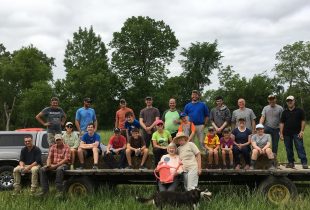Wetlands and Sustainable Livelihoods
World Wetlands Day focuses on people working in harmony with nature

A forestry planner is mapping out the path to a stand of trees. Research and conservation tools will help her company locate roads that avoid wetlands. When this is not possible, it will construct low-impact wetland crossings. Best management practices guide its work so as to leave behind clean water, and land that is prime for new growth, when the harvest is complete.
These foresters are collecting a renewable, natural resource that we all need. And they are committed to a responsibility to do so in a way that’s sustainable.
On February 2nd, World Wetlands Day will celebrate Sustainable Livelihoods. The global theme calls attention to an essential part of modern day wetland conservation – the sustainable use of our land and water. This concept is integral to the conservation goals of DUC.
“Our conservation specialists work hand-in-hand with Canadians who earn their living off the land,” says Greg Siekaniec, DUC’s chief executive officer. “Our work is more than protecting and restoring habitat. It’s also about sharing knowledge about wetland conservation where industrial activities are taking place. Sustainable practices will allow Canada to thrive long into the future, in harmony with nature instead of at the cost of nature.”
Wetlands are essential to the health and wellbeing of Canada’s water, wildlife and people. However, in the past, they have been undervalued and in some cases, viewed as a nuisance to industry. Because of this, many of Canada’s wetlands have been drained. In the worst cases, such as some areas on the prairies, as much as 90% of our wetlands have disappeared.
“We can’t afford to lose any more wetlands. Communities are suffering the effects of wetland loss, like impacts on water quality, lost habitat, flooding and drought,” says Siekaniec. “Individuals, as well as companies, understand they have an environmental and social responsibility as part of how they do business.”
DUC is involved in several partnerships that work to research, develop and implement sustainable practices. This includes work with forestry and other natural resource based industries, agriculture, fisheries, urban planners and communities that rely on traditional livelihoods.
“Many Canadians make their living by working with the land,” says Siekaniec. “And they are proud to do their part to help take care of it. People understand that sustainable practices today will allow them to share their livelihood with the next generation of Canadian farmers, fishery workers and foresters.”
Help us do more to develop sustainable practices in Canada.
Donate now Other ways to helpAbout World Wetlands Day: February 2nd marks the adoption of the Convention of Wetlands, which took place in 1971 in the Iranian city of Ramsar. It’s a treaty negotiated by countries and non-governmental organizations, which provides the framework for the conservation and wise use of wetlands. Canada is one of the treaty’s 138 contracting nation states and currently has 37 designated Ramsar sites. Of these, 17 are national wildlife areas or migratory bird sanctuaries.



